Biden’s First State of the Union Leaves the Mideast Out
America’s allies in region, seeing US shift, are ‘diversifying their foreign relations’
US President Joe Biden’s first State of the Union address was dominated by the Russian war in Ukraine and did not once mention the Middle East.
The region’s issues and concerns were completely absent from Biden’s speech. He didn’t refer to the Israeli-Palestinian conflict nor did he mention the talks in Vienna on Iran’s nuclear deal.
The American president didn’t bring up Washington’s perennial complaint of Tehran “meddling” in its neighbor’s internal affairs, and the 70-minute-long speech, which was interrupted several times by applause from both sides of the political spectrum, didn’t mention the war in Yemen and its humanitarian cost.
He talked about the health consequences suffered by US soldiers who fought in Iraq and Afghanistan but he refrained from mentioning the political instability in both countries.
Israel-Palestine has been marginalized and this is not new. In the last few years, Israel-Palestine has been moved to the back burner.
Ghassan Khatib, a professor of political science and cultural studies at Birzeit University, near Ramallah, told The Media Line there are several reasons why the Middle East took a backseat in Biden’s State of the Union speech.
“Israel-Palestine has been marginalized and this is not new. In the last few years, Israel-Palestine has been moved to the back burner. For several reasons, there’s no prospect for any political progress and there’s no fear of possible eruption of violence,” Khatib says.
He argues that since there’s no prospect for war and no hope for peace on the horizon, investing time and political capital in the conflict “becomes less attractive and of less concern to the outside world.”
This holiday season, give to:
Truth and understanding
The Media Line's intrepid correspondents are in Israel, Gaza, Lebanon, Syria and Pakistan providing first-person reporting.
They all said they cover it.
We see it.
We report with just one agenda: the truth.


The Biden administration’s focus, and to an extent Congress’ priorities, have shifted in recent years, Khatib says.
The US is no longer paying enough attention to the region, he says.
“United States foreign policy has been witnessing strategic changes in the last years, mainly reducing the American presence and attention in the Middle East and moving its focus to the Far East, China, and related issues,” Khatib says.
Israeli journalist-turned-political-analyst Eli Nissan also told The Media Line that Washington’s interest in the Middle East is dwindling.
It is no longer a prime focus of US attention, after “the failure of many past US initiatives to resolve the Israeli-Palestinian conflict, the most recent of which was President [Donald] Trump’s efforts and the so-called deal of the century, which failed,” Nissan says.
He attributes the change to more urgent conflicts and crises around the globe. “There are new developments taking place in the world, like what is happening in Ukraine, and American attention today is not focused on the Middle East.
“Confronting [Russian President Vladimir] Putin and domestic matters that are important to the American people, such as the corona pandemic and the economy,” are more pressing than the Middle East, Nissan says.
Not having the Middle East on top of the administration’s agenda worries many US allies in the region.
The people of the Middle East should be concerned and should reconsider their alliances. In the past, most of the Arab Gulf regimes put all their eggs in the American basket.
This is definitely the case, Khatib says.
“The people of the Middle East should be concerned and should reconsider their alliances. In the past, most of the Arab Gulf regimes put all their eggs in the American basket. It’s already clear that they are shifting and diversifying their foreign relations” to include other parts of the world, he elaborates.
He points to the United Arab Emirates’ refusal to join the US in voting for a UN resolution condemning Russia as an example of this change.
“That’s a significant shift where leaders of the region are taking into consideration the new geopolitical realities and [the reduction in] US support,” says Khatib.
Israel worries about one thing, that the United States and Europe are reaching an agreement on Iran’s nuclear program that does not serve its interests.
Nissan says Israel isn’t bothered by the US shifting its attention elsewhere, as long as the Jewish state’s chief concern is dealt with to its satisfaction.
“Israel worries about one thing, that the United States and Europe are reaching an agreement on Iran’s nuclear program that does not serve its interests. Therefore, Israel is trying behind the scenes [to make sure the Western nations do] not sign an agreement with Iran that does not prevent Iran from acquiring nuclear weapons,” says Nissan.

